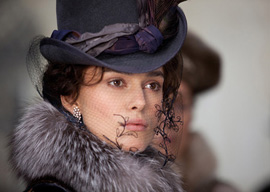
November 21, 2012

Keira Knightley
Joe Wright first directed Keira Knightley in a decent remake of Pride and Prejudice in 2005. Two years later, Wright and Knightley almost hit the Academy Award jackpot with the glossy Atonement, an adaptation of Ian McEwan’s celebrated bestseller. I argued at the time, though, that Wright and his screenwriter Christopher Hampton were overly in awe of McEwan’s merely good novel, making their adaptation too faithful to truly work as a movie.
Now Wright and Knightley are back for a third try, one that solves the problems I saw in Atonement. This time Wright has picked a really good book, Tolstoy’s 1870s novel Anna Karenina, and has hired the one living screenwriter able to chop the Russian giant’s 350,000-word classic down to a 130-minute movie: the great playwright Tom Stoppard.
“Anna Karenina has been adapted for the screen frequently, including Greta Garbo’s take, but Wright’s version is astonishing. Many will find it over-stylized and cold, but I was enraptured.”
I”m probably the ideal audience for Stoppard’s terse screenplay because I”ve listened to my wife describe Anna Karenina‘s characters and plot enough times over the years that I wasn”t lost watching the movie. Yet having never actually opened the book, I couldn”t be resentful”as so many better-read critics have been”that the filmmakers didn”t squeeze in all my favorite scenes.
Stoppard is often attacked for his notorious cleverness, but he tries to use his brainpower to make audience comprehension as simple as possible (but not simpler).
Russian novels, however, are notorious for their endless characters with endless names. For example, Anna’s husband is Count Alexei Alexandrovich Karenin, while her lover is Count Alexei Kirillovich Vronsky. In his narration, Tolstoy gets around this self-inflicted problem by calling the father of Anna’s son “Alexei Alexandrovich” and the father of her daughter “Vronsky.” To help Western audiences, Stoppard mostly skips the middle names.
Besides cutting away until he ends up with an efficient rendition of the grand plot, Stoppard adds a brilliant new climax to the steeplechase scene that Tolstoy had overlooked, perhaps because it didn”t occur to him how confounding having two Alexeis might be to foreigners. In Stoppard’s variation, when Vronsky falls in a horse race for cavalry officers, Anna screams “Alexei!” Her husband comes running when she calls his name, only for her to ignore him in front of tout le Moscou in her anguish over her new Alexei.
Stoppard presumably lifted this device from the most shocking scene in Evelyn Waugh’s 1934 novel A Handful of Dust, in which the wife has a young son and a lover both named “John.” Informed only of the death of “John,” she exclaims “Oh, thank God” when she then
learns that it was merely her little boy who was killed in an equestrian accident. (Here’s a recent interview with Stoppard to promote Anna Karenina where he cites A Handful of Dust as a “masterpiece.”)
Anna Karenina has been adapted for the screen frequently, including Greta Garbo’s take, but Wright’s version is astonishing. Many will find it over-stylized and cold, but I was enraptured.